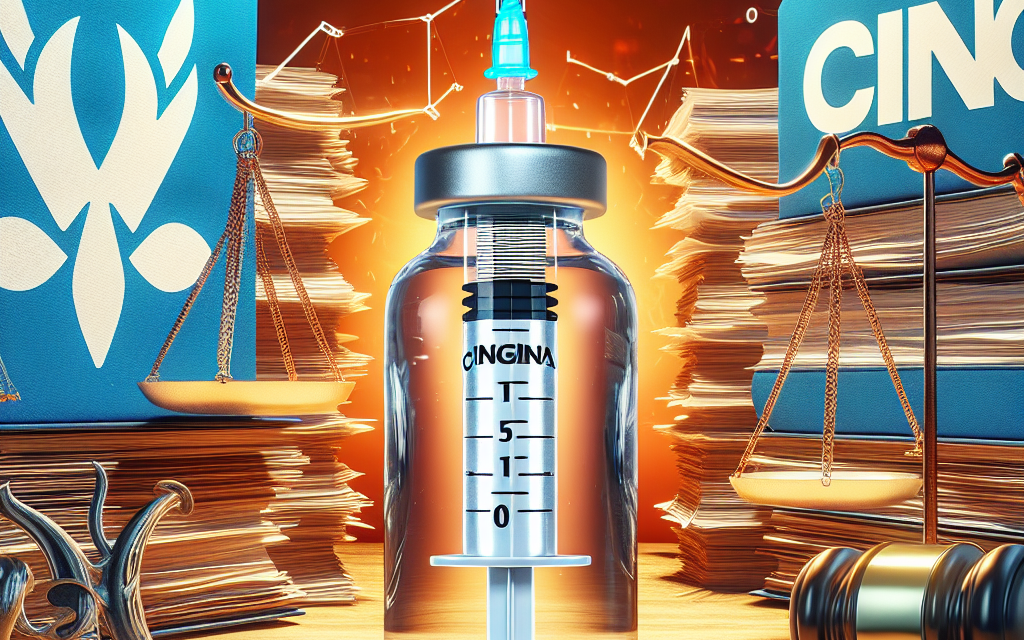UnitedHealth, Cigna, CVS Challenge FTC’s Insulin Litigation Procedures
The rising cost of insulin has become a pressing issue in the United States, prompting various stakeholders, including healthcare providers, insurers, and pharmaceutical companies, to engage in a complex legal and regulatory battle. Recently, major players in the healthcare industry, such as UnitedHealth Group, Cigna, and CVS Health, have challenged the Federal Trade Commission’s (FTC) procedures regarding litigation related to insulin pricing. This article delves into the intricacies of this challenge, exploring the implications for the healthcare system, the role of the FTC, and the broader context of insulin pricing in America.
Understanding the Insulin Pricing Crisis
The cost of insulin has skyrocketed over the past two decades, leading to significant public outcry and legislative scrutiny. According to a report from the Health Care Cost Institute, the average price of insulin nearly tripled between 2002 and 2013, with some patients paying upwards of $1,000 per month for their medication. This dramatic increase has had dire consequences for many individuals with diabetes, leading to medication non-adherence and, in some cases, preventable hospitalizations.
Several factors contribute to the rising cost of insulin, including:
- Pharmaceutical Pricing Strategies: Pharmaceutical companies often employ complex pricing strategies that can obscure the true cost of insulin. Discounts, rebates, and other financial incentives can create a confusing landscape for consumers.
- Market Competition: While there are multiple insulin products available, the market is dominated by a few major manufacturers, which can limit competition and keep prices high.
- Insurance Coverage: The way insurance plans cover insulin can vary significantly, with some plans imposing high deductibles or co-pays that make access to affordable insulin difficult for patients.
- Regulatory Environment: The regulatory framework governing drug pricing and approval can impact the availability and cost of insulin, with some advocates calling for more transparency and accountability.
As a result of these factors, many patients are forced to make difficult choices about their health, often prioritizing other expenses over their insulin needs. This crisis has prompted calls for reform at both the state and federal levels, with lawmakers seeking to address the underlying issues driving insulin prices higher.
The Role of the FTC in Regulating Drug Pricing
The Federal Trade Commission (FTC) plays a crucial role in regulating competition and protecting consumers in the healthcare market. One of its primary responsibilities is to prevent anti-competitive practices that can lead to inflated prices for essential medications, including insulin. The FTC has the authority to investigate and challenge mergers and acquisitions that may reduce competition in the pharmaceutical industry, as well as to enforce laws against deceptive marketing practices.
In recent years, the FTC has taken a more active stance on drug pricing, particularly in response to public outcry over the rising costs of essential medications. The agency has launched investigations into various pharmaceutical companies and their pricing practices, seeking to uncover any anti-competitive behavior that may be contributing to the insulin crisis.
Key actions taken by the FTC include:
- Investigating Mergers: The FTC has scrutinized proposed mergers between pharmaceutical companies to ensure that they do not reduce competition and lead to higher prices for consumers.
- Enforcing Antitrust Laws: The agency has pursued legal action against companies that engage in anti-competitive practices, such as pay-for-delay agreements that keep lower-cost generics off the market.
- Promoting Transparency: The FTC has advocated for greater transparency in drug pricing, encouraging companies to disclose their pricing strategies and the factors that contribute to high costs.
Despite these efforts, the FTC faces significant challenges in addressing the complex dynamics of the pharmaceutical market. The agency’s ability to effect change is often limited by the intricate web of regulations and the influence of powerful industry stakeholders.
UnitedHealth, Cigna, and CVS: The Challenge to FTC Procedures
In response to the FTC’s increasing scrutiny of insulin pricing and its regulatory procedures, major healthcare players like UnitedHealth, Cigna, and CVS have mounted a challenge. These companies argue that the FTC’s approach to litigation and regulation is overly aggressive and could have unintended consequences for the healthcare system.
One of the primary concerns raised by these companies is that the FTC’s actions could stifle innovation in the pharmaceutical industry. They argue that aggressive enforcement of antitrust laws could deter companies from investing in research and development for new insulin products, ultimately limiting options for patients.
Additionally, these companies contend that the FTC’s procedures may not adequately consider the complexities of the healthcare market. They argue that a one-size-fits-all approach to regulation could lead to negative outcomes for both consumers and providers.
Key points raised by UnitedHealth, Cigna, and CVS include:
- Impact on Innovation: The companies argue that stringent regulatory measures could discourage investment in new treatments and technologies that could improve patient outcomes.
- Market Dynamics: They emphasize the need for a nuanced understanding of market dynamics, arguing that simplistic regulatory approaches may not address the root causes of high insulin prices.
- Collaboration with Regulators: The companies advocate for a collaborative approach between industry stakeholders and regulators to develop effective solutions to the insulin pricing crisis.
This challenge to the FTC’s procedures highlights the tension between regulatory oversight and the need for a competitive and innovative healthcare market. As the debate continues, it remains to be seen how the FTC will respond and what impact this will have on insulin pricing and access for patients.
The Broader Implications for Patients and Healthcare Providers
The ongoing legal battle between major healthcare companies and the FTC has significant implications for patients and healthcare providers alike. As insulin prices continue to rise, the stakes are high for individuals who rely on this essential medication to manage their diabetes.
For patients, the outcome of this challenge could determine their access to affordable insulin and other diabetes management tools. If the FTC’s regulatory measures are weakened, there is a risk that prices could continue to rise unchecked, further exacerbating the financial burden on patients.
Healthcare providers also face challenges in this evolving landscape. Rising insulin prices can lead to increased patient non-adherence, which can ultimately result in worse health outcomes and higher healthcare costs. Providers may find themselves in a difficult position, trying to balance the need for effective treatment with the realities of their patients’ financial constraints.
Key implications for patients and providers include:
- Access to Medications: Patients may face increased barriers to accessing affordable insulin, leading to potential health complications.
- Healthcare Costs: Rising insulin prices can contribute to overall healthcare costs, impacting both patients and providers.
- Patient Education: Providers may need to invest more in patient education and support to help individuals navigate the complexities of insulin pricing and insurance coverage.
As the legal battle unfolds, it is crucial for all stakeholders to remain engaged in the conversation about insulin pricing and access. Collaborative efforts between regulators, healthcare providers, and pharmaceutical companies will be essential in finding sustainable solutions to this pressing issue.
Potential Solutions and Future Directions
Addressing the insulin pricing crisis requires a multifaceted approach that involves collaboration among various stakeholders, including pharmaceutical companies, insurers, healthcare providers, and regulators. While the challenge to the FTC’s procedures raises important questions about regulation and competition, it also presents an opportunity to explore innovative solutions to improve access to affordable insulin.
Some potential solutions include:
- Price Transparency Initiatives: Implementing initiatives that promote transparency in drug pricing can help consumers make informed decisions about their healthcare. This could involve requiring pharmaceutical companies to disclose pricing information and the factors that contribute to costs.
- Value-Based Pricing Models: Adopting value-based pricing models that tie the cost of insulin to patient outcomes could incentivize manufacturers to focus on developing effective treatments while ensuring affordability for patients.
- Enhanced Generic Competition: Encouraging the development and approval of generic insulin products can increase competition in the market and help drive down prices.
- Patient Assistance Programs: Expanding patient assistance programs offered by pharmaceutical companies and non-profit organizations can help individuals access the medications they need without facing financial hardship.
- Legislative Action: Advocating for legislative measures that address drug pricing and promote competition in the pharmaceutical market can create a more sustainable environment for insulin pricing.
As stakeholders work together to develop and implement these solutions, it is essential to keep the needs of patients at the forefront of the conversation. By prioritizing access to affordable insulin, the healthcare system can better support individuals living with diabetes and improve overall health outcomes.
Conclusion
The challenge posed by UnitedHealth, Cigna, and CVS to the FTC’s insulin litigation procedures underscores the complexities of the healthcare landscape in the United States. As insulin prices continue to rise, the need for effective regulation and innovative solutions has never been more urgent. The interplay between regulatory oversight and market dynamics will shape the future of insulin pricing and access for millions of Americans.
Ultimately, addressing the insulin pricing crisis requires collaboration among all stakeholders, including regulators, healthcare providers, pharmaceutical companies, and patients. By working together to promote transparency, competition, and affordability, it is possible to create a more equitable healthcare system that prioritizes the needs of individuals living with diabetes.
As this legal battle unfolds, it is crucial for all parties involved to remain committed to finding solutions that ensure access to affordable insulin and improve health outcomes for patients across the country. The stakes are high, and the time for action is now.




